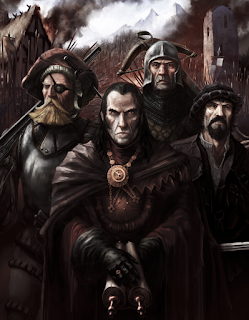Balance. What all great multiplayer games strive for. Whatever your tastes, odds are there is at least one game in your catalogue that is constantly being patched and updated by the dev team (looking at you Destiny 2) in pursuit of a "fair" experience for all players. Funnily enough, there always seems to be a vocal part of such a game's community that gripes about every update. There also seems to be no end to the updates, as they usually continue until the next game in the franchise is released and support ceases for the previous entry. All this in the name of balance, yet balance seems to always be just out of reach. What does this have to do with Dungeons & Dragons you ask?
Perfectly balanced. As all things should be. Unless?
The current generation of TTRPGs also has this obsession with balance. WotC's periodical releases of Unearthed Arcana not only provide new content for 5E, but tweak existing classes and features of the game to be more "balanced". This may come as a surprise to WotC's playerbase, but Advanced Dungeons & Dragons had little concern for balance. In fact, the games classes were designed to vary drastically in terms of playstyle in order to create a kind of co-dependency among the party members. Fighters were maybe the most competent by 5E standards; good in a fight, d10 hit die, extra attacks as you level up, trained in all weapons. A party of only fighters could go far in a dungeon rife with goblins, but were not stealthy, were helpless against magic, and had no healing without a good stock of potions. Clerics were decent fighters in their own right, but as the main source of healing and magical protection in the party, typically were needed behind the front line in a support role. Thieves were straight up useless in a head-to-head fight, though their ability to scout enemies beforehand, get in a sneaky backstab, and get out usually gave the rest of the party greater advantage in combat. The magic-user was infamously squishy, and got a slow start with spells, but that power went up exponentially as they grew in level.
Wizards are OP! When will TSR buff fighters?
The vast power gain attainable by magic-users after a brief period of impotency in the early game was a stark contrast to the steady gain attainable by fighters, which ultimately fell short of the godlike powers that magic grants. This wide spectrum of (subjective) fighting ability fell out of favor in later editions, as progression for all classes became more linear, and new feats compensated for power gaps between classes. It's my humble opinion that these changes in the name of balance ultimately made a player's choice of class less meaningful. When every class can fill any role in the party, why even bother with classes? There are some successful classless OSR systems built on this very concept. I will maintain that if an RPG system has classes, they should be wildly out of balance.
Think about it. When it comes to unbalanced classes, what are you afraid of? That the wizard will nuke all possible threats before his companions even have a chance to jump in? If one of your party members never lets the other PCs step up to do the thing their classes are good at, that's a player problem, not a game design problem. Maybe you're worried players will be so overcome with envy at their companions' abilities that they will be unable to enjoy the game (remember the talk we had about thief skills being used by other classes?). Time to put on your big boy DM pants and push your players to get creative with their characters and find the special thing that they can do well. Okay, what if all of your players want to play the same class because they view it as superior to all other choices? That sounds like a lot of fun to me.
Or maybe you worry that one or two classes have so much potential, their design could be taken advantage of in order to steamroll every encounter you throw at the party? Sounds like you're still trying to balance encounters, and that's a topic worthy of its own article.



Comments
Post a Comment